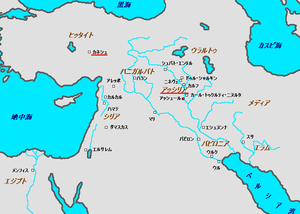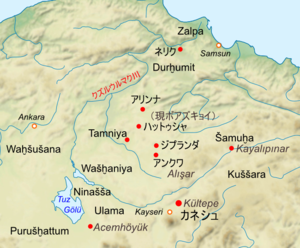「ハンナハンナ」の版間の差分
(→関連項目) |
|||
| (同じ利用者による、間の44版が非表示) | |||
| 1行目: | 1行目: | ||
| + | [[File:Assyria.png|thumb|古アッシリア時代(紀元前1950年頃~15世紀)、アッシリア商人は商業植民市(カールム)カネシュを建設した。]] | ||
| + | [[File:KarumKanis.png|thumb|]] | ||
'''ハンナハンナ(Ḫannaḫanna)'''(ヒッタイト語の「ハンナ(祖母)」という言葉に由来する)はハッティ族の母神で、「偉大な祖母」という意味である<ref>Volkert Haas, Heidemarie Koch: ''Religionen des alten Orients: Hethiter und Iran.'' Göttingen 2011, S. 224.</ref>。ハンナハンナはメソポタミアの母神ディンギルマー(ニンフルサグ)と同一視された<ref>Piotr Taracha: ''Religions of Second Millennium Anatolia.'' Wiesbaden 2009, S. 125.</ref>。 | '''ハンナハンナ(Ḫannaḫanna)'''(ヒッタイト語の「ハンナ(祖母)」という言葉に由来する)はハッティ族の母神で、「偉大な祖母」という意味である<ref>Volkert Haas, Heidemarie Koch: ''Religionen des alten Orients: Hethiter und Iran.'' Göttingen 2011, S. 224.</ref>。ハンナハンナはメソポタミアの母神ディンギルマー(ニンフルサグ)と同一視された<ref>Piotr Taracha: ''Religions of Second Millennium Anatolia.'' Wiesbaden 2009, S. 125.</ref>。 | ||
| − | ハンナハンナは楔型文字でDINGIR. | + | ハンナハンナは楔型文字でDINGIR.MAḪ(「偉大なる神」の意)と書かれ、時にはNIN.TUと表され、フリギアの女神キュベレーの前身の一つと考えられている。<ref>[https://www.routledgehandbooks.com/doi/10.4324/9781315747910.ch2 Fertility and Gender in the Ancient Near East]</ref> |
クリストファー・シレンはハンナハンナはガルセスと関連していると述べている。 | クリストファー・シレンはハンナハンナはガルセスと関連していると述べている。 | ||
| + | |||
| + | == 役割と信仰 == | ||
| + | ハンナハンナは母神として出産を司った。出産の儀式では、彼女が着座する場所が定められていなかったが、その代わりに妊婦の傍らにいるとされた<ref>Volkert Haas: ''Die hethitische Literatur.'' Berlin 2006, S. 198.</ref>。ハンナハンナはカールム・カネシュで重要な女神とされた<ref>Piotr Taracha: ''Religions of Second Millennium Anatolia''. Wiesbaden 2009, S. 31.</ref>。 | ||
== 神話 == | == 神話 == | ||
| − | + | テリピヌが姿を消した後、父である嵐神タルフント(あるいはテシュブ)はハンナハンナに苦情を言った。ハンナハンナはテリピヌ捜索のためタルフントを送り出した。タルフントが諦めるとハンナハンナはテリピヌを見つけるよう命令し、ミツバチを派遣した。ミツバチはテリピヌを見つけると、手足を刺し、目と足を蜜蝋で拭いて、神を清め、強くした。 | |
| + | |||
| + | 彼女は、海神の娘とテリピヌの結婚のために、結納金をタルフントから海神に支払わせた。 | ||
| + | |||
| + | イナラに相談を受けて、ハンナハンナはイナラに一人の男と土地を与えた。ほどなくしてイナラは行方不明になり、ハンナハンナは嵐神のミツバチからこの知らせを受けると、侍女に手伝わせて捜索を始めたようだ。どうやら、デーメーテールのようにハンナハンナは怒りのあまりしばらく姿を消し、彼女が隠れている間、牛や羊は窒息し、人や動物の母親は我が子を顧みなくなった。 | ||
| + | |||
| + | 彼女の怒りが黄泉の国に払われると、女神は喜びを取り戻し、母親達は再び家族を世話し始めた。ハンナハンナの怒りを払う他の方法は、そだを燃やし、蒸気が女神の体内に入ることだった。この文書や他の文書で、ハンナハンナは太陽神や戦争の神に相談しているようだが、文書の多くは欠落している。 | ||
| − | + | == その他の祖神 == | |
| + | ハンナハンナだけがヒッタイトの神殿の祖神というだけではなかった。 | ||
| − | + | 天候神の父であり、別の天候神の祖父神でもあるフッハ(Ḫuḫḫa)(ヒッタイト語の''ḫuḫḫa-''は祖父という意味)がいた。 | |
| − | + | 祖母女神アマンマ(Ammamma)(ヒッタイト語の''amma-''はおそらく母という意味)も知られている。アマンマは自然と豊穣の女神である<ref>Piotr Taracha: ''Religions of Second Millennium Anatolia''. Wiesbaden 2009, S. 57.</ref>。 | |
| − | == | + | == ハンナハンナと聖書のハンナ == |
| − | + | ハンナハンナという名は聖書中のサムエルの母ハンナ(列王記より)、カナンの女神アナト、聖アンナと似ているが、これらは偶然である。アンやハンナという名前は聖書の「ハンナ(''Channah'')」に由来し、「親切」あるいは「しとやか」を意味する<ref>http://www.behindthename.com/name/hannah</ref>。一方、アナトはセム語に起源を持ち、「泉」を意味する<ref>http://www.behindthename.com/name/anat-1</ref>。 | |
| − | == | + | == 関連項目 == |
{{Portal|Mythology|Asia}} | {{Portal|Mythology|Asia}} | ||
| − | * [[Hittite mythology]] | + | <!--- * [[Hittite mythology]] ---> |
| − | * [[Hurrian mythology]] | + | <!--- * [[Hurrian mythology]] ---> |
| + | * [[ハテプナ]] | ||
| + | * [[蜂]] | ||
| − | == | + | == 出典 == |
* [https://web.archive.org/web/20040706151443/http://home.comcast.net/~chris.s/hittite-ref.html Christopher Siren] | * [https://web.archive.org/web/20040706151443/http://home.comcast.net/~chris.s/hittite-ref.html Christopher Siren] | ||
| + | * [https://de.wikipedia.org/wiki/%E1%B8%AAanna%E1%B8%ABanna Ḫannaḫanna] | ||
| + | ドイツ語版Wikipediaの内容も参考にしています。 | ||
| − | == | + | == 脚注 == |
{{Reflist}} | {{Reflist}} | ||
| 32行目: | 48行目: | ||
[[Category:母神]] | [[Category:母神]] | ||
[[Category:ハッティ神話]] | [[Category:ハッティ神話]] | ||
| + | [[Category:ハンナハンナ]] | ||
2023年2月13日 (月) 13:02時点における最新版
ハンナハンナ(Ḫannaḫanna)(ヒッタイト語の「ハンナ(祖母)」という言葉に由来する)はハッティ族の母神で、「偉大な祖母」という意味である[1]。ハンナハンナはメソポタミアの母神ディンギルマー(ニンフルサグ)と同一視された[2]。
ハンナハンナは楔型文字でDINGIR.MAḪ(「偉大なる神」の意)と書かれ、時にはNIN.TUと表され、フリギアの女神キュベレーの前身の一つと考えられている。[3]
クリストファー・シレンはハンナハンナはガルセスと関連していると述べている。
役割と信仰[編集]
ハンナハンナは母神として出産を司った。出産の儀式では、彼女が着座する場所が定められていなかったが、その代わりに妊婦の傍らにいるとされた[4]。ハンナハンナはカールム・カネシュで重要な女神とされた[5]。
神話[編集]
テリピヌが姿を消した後、父である嵐神タルフント(あるいはテシュブ)はハンナハンナに苦情を言った。ハンナハンナはテリピヌ捜索のためタルフントを送り出した。タルフントが諦めるとハンナハンナはテリピヌを見つけるよう命令し、ミツバチを派遣した。ミツバチはテリピヌを見つけると、手足を刺し、目と足を蜜蝋で拭いて、神を清め、強くした。
彼女は、海神の娘とテリピヌの結婚のために、結納金をタルフントから海神に支払わせた。
イナラに相談を受けて、ハンナハンナはイナラに一人の男と土地を与えた。ほどなくしてイナラは行方不明になり、ハンナハンナは嵐神のミツバチからこの知らせを受けると、侍女に手伝わせて捜索を始めたようだ。どうやら、デーメーテールのようにハンナハンナは怒りのあまりしばらく姿を消し、彼女が隠れている間、牛や羊は窒息し、人や動物の母親は我が子を顧みなくなった。
彼女の怒りが黄泉の国に払われると、女神は喜びを取り戻し、母親達は再び家族を世話し始めた。ハンナハンナの怒りを払う他の方法は、そだを燃やし、蒸気が女神の体内に入ることだった。この文書や他の文書で、ハンナハンナは太陽神や戦争の神に相談しているようだが、文書の多くは欠落している。
その他の祖神[編集]
ハンナハンナだけがヒッタイトの神殿の祖神というだけではなかった。
天候神の父であり、別の天候神の祖父神でもあるフッハ(Ḫuḫḫa)(ヒッタイト語のḫuḫḫa-は祖父という意味)がいた。
祖母女神アマンマ(Ammamma)(ヒッタイト語のamma-はおそらく母という意味)も知られている。アマンマは自然と豊穣の女神である[6]。
ハンナハンナと聖書のハンナ[編集]
ハンナハンナという名は聖書中のサムエルの母ハンナ(列王記より)、カナンの女神アナト、聖アンナと似ているが、これらは偶然である。アンやハンナという名前は聖書の「ハンナ(Channah)」に由来し、「親切」あるいは「しとやか」を意味する[7]。一方、アナトはセム語に起源を持ち、「泉」を意味する[8]。
関連項目[編集]
出典[編集]
ドイツ語版Wikipediaの内容も参考にしています。
脚注[編集]
- ↑ Volkert Haas, Heidemarie Koch: Religionen des alten Orients: Hethiter und Iran. Göttingen 2011, S. 224.
- ↑ Piotr Taracha: Religions of Second Millennium Anatolia. Wiesbaden 2009, S. 125.
- ↑ Fertility and Gender in the Ancient Near East
- ↑ Volkert Haas: Die hethitische Literatur. Berlin 2006, S. 198.
- ↑ Piotr Taracha: Religions of Second Millennium Anatolia. Wiesbaden 2009, S. 31.
- ↑ Piotr Taracha: Religions of Second Millennium Anatolia. Wiesbaden 2009, S. 57.
- ↑ http://www.behindthename.com/name/hannah
- ↑ http://www.behindthename.com/name/anat-1

